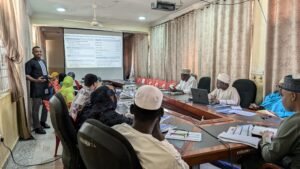Over 66.1 percent of expectant mothers in Kano State have shown inadequate understanding of pre-eclampsia and eclampsia highlighting a critical gap in maternal health education.
This is according to a recent research conducted by the Solina Center for International Development and Research (SCIDaR).
The nine months research funded by Ferrings Pharmaceuticals; which ended May 2024, also revealed that 94.7% of pregnant women in Kano, in their second trimester, lack knowledge on pre-eclampsia.

Dr. Eric Aigbogun, the Senior Engagement Manager for SCIDaR and manager for the Knowledge Management and Learning Unit revealed this on Thursday during the presentation of the research at the Kano State Ministry of Health.
According to a 2008 study, pre-eclampsia, and eclampsia were a leading cause of maternal deaths in Kano state at about 48%.
Eclampsia is a pregnancy complication which is characterized by high blood pressure and potential damage to other organ systems, most often the liver and kidneys.
“We are here today to share the findings from our research, which focus on understanding the perceptions of caregivers and care providers in identifying and managing pre-eclampsia in Kano.
“The research sampled 828 expectant mothers in 16 different health facilities across two Local Government Areas: Ungogo and Kumbotso.
“We selected two LGAs based on pre-designed criteria agreed upon with Ferrings to gain precise insights into the existing conditions.
Dr. Aigbogun revealed that the inadequate knowledge of pre-eclampsia among pregnant women, posed serious health risks to both the mothers and babies.
He noted that pre-eclampsia and eclampsia are real concerns, and the knowledge and understanding are low, with the study showing 66.1% of who? lacking adequate knowledge.
The study also found poor practices and identified significant gaps in managing pre-eclampsia at the institutional level.
The Senior Engagement Manager added that positive attitudes need to be backed by access to medications and trained healthcare professionals to make a real difference.
He revealed that 98.5% of healthcare workers in the state have not attended training related to the management of pre-eclampsia and eclampsia in the past 5-10 years.
“This is why we are collaborating with the state government to expand the research as a means of finding solutions to the problem.”
He further revealed that the center has developed an application for collecting maternal data at facility levels.
“This dashboard has been updated with new insights based on existing guidelines, particularly for clinical diagnosis related to pre-eclampsia.
“We developed this dashboard to track the progress of mothers from their initial visit to the facility until they give birth,” he explained.
Earlier, the Director of Public Health and Disease Control, Dr. Imam Wada Bello, assured the center of the state government’s commitment to addressing the issue.
The Director expressed that the collaboration is a welcome development, noting that this is the first time an organization will co-design studies, share findings, and take recommendations from the state for the next steps of the research.
Dr. Ibrahim Adamu Gano, the Tuberculosis and leprosy Program Manager who is also the Deputy Director of Training and Man Power at the Ministry of Health noted that massive sensitization efforts are needed in Kano to bridge the gaps in knowledge about eclampsia.
Haj. Nafisa Murtala Ahmad, a journalist with Express Radio Kano and a member of the Kano State-led Accountability Mechanism (KanSLAM), emphasized the importance of addressing maternal health issues from a human-centered design perspective.
Ahmad highlighted the need for a comprehensive strategy to improve maternal health, including better reception and support for pregnant women from caregivers.
She noted that, “pregnant women are battling with hormonal changes and need a supportive and understanding environment.”
She also called on pregnant women to take proactive care of their health, stressing the importance of self-awareness and proper medical attention throughout their pregnancy.
Nigeria contributes to 10% of global maternal mortality.
If Nigeria is to achieve the SDG3.1 target of reducing the global maternal mortality ratio to less than 70 per 100,000 births. More knowledge, better attitude and improved practice of the management of contributory factors should be addressed.